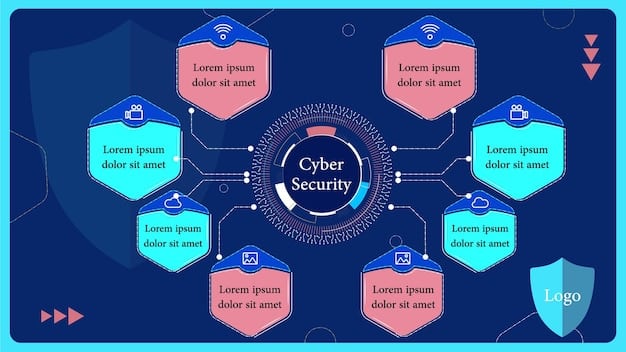Cybersecurity Compliance: Startup Protection in 2025

Cybersecurity Compliance: Protecting Your Startup’s Data and Meeting Legal Requirements in 2025 is crucial for startups to safeguard data, avoid legal issues, and maintain customer trust. By understanding and implementing the right compliance measures, startups can thrive in a secure digital environment.
In today’s digital age, startups face increasing cybersecurity threats. Navigating the complex landscape of cybersecurity compliance: protecting your startup’s data and meeting legal requirements in 2025 is essential for safeguarding your business and building trust with customers.
Let’s explore how your startup can achieve robust cybersecurity compliance, avoid costly penalties, and ensure long-term success. Are you ready to protect your startup in 2025?
Understanding the Importance of Cybersecurity Compliance for Startups
Cybersecurity compliance is not just a legal obligation; it’s a strategic imperative for startups. Protecting sensitive data and adhering to industry regulations can significantly impact your startup’s reputation, customer loyalty, and overall success. Ignoring cybersecurity compliance: protecting your startup’s data and meeting legal requirements in 2025 can lead to severe consequences.
What Does Cybersecurity Compliance Entail?
Cybersecurity compliance includes various measures aimed at protecting data and meeting legal standards. It involves implementing policies, procedures, and technologies to safeguard sensitive information from unauthorized access, use, disclosure, disruption, modification, or destruction.
Here are some key aspects:
- Data Encryption: Encrypting sensitive data both in transit and at rest.
- Access Controls: Implementing strict access controls to limit who can access specific data.
- Incident Response Plan: Having a well-defined plan for responding to and recovering from security incidents.
- Regular Audits: Conducting regular security audits to identify and address vulnerabilities.
Compliance with standards such as GDPR, CCPA, and HIPAA ensures your startup is aligned with best practices.

Why Startups Cannot Afford to Neglect Cybersecurity Compliance
Startups often operate with limited resources, making them attractive targets for cyberattacks. A data breach can result in significant financial losses, legal penalties, and reputational damage. Prioritizing cybersecurity compliance: protecting your startup’s data and meeting legal requirements in 2025 can save you from these potential disasters.
In conclusion, cybersecurity compliance is a necessity for startups. It helps to protect data, build trust, and ensure long-term sustainability.
Key Legal Requirements for Cybersecurity in 2025
Staying informed about the key legal requirements for cybersecurity is crucial for startups. Several regulations worldwide mandate specific data protection measures. Understanding these requirements can help your startup avoid legal pitfalls.
Overview of GDPR, CCPA, and Other Relevant Laws
The General Data Protection Regulation (GDPR) in Europe and the California Consumer Privacy Act (CCPA) in the United States are two prominent examples of data protection laws. GDPR applies to organizations processing personal data of EU residents, while CCPA protects the privacy rights of California consumers. Other relevant laws include HIPAA for healthcare data and PCI DSS for payment card information.
Complying with these regulations involves understanding the scope of the law, implementing necessary security measures, and documenting processes to demonstrate compliance.
Steps to Ensure Legal Compliance
To ensure legal compliance with data protection laws, startups should take several key steps:
- Data Mapping: Identify and document all personal data your startup collects, processes, and stores.
- Privacy Policies: Develop clear and transparent privacy policies explaining how you handle personal data.
- Data Security Measures: Implement appropriate technical and organizational measures to protect personal data.
- Consent Management: Obtain valid consent for processing personal data where required.
Regularly review and update your compliance measures to adapt to changes in the legal landscape.
The Impact of Non-Compliance
Failure to comply with data protection laws can result in significant penalties. GDPR, for example, can impose fines of up to 4% of annual global turnover or €20 million, whichever is higher. CCPA also carries substantial fines for violations. Furthermore, non-compliance can lead to lawsuits, loss of customer trust, and damage to your startup’s reputation.
Therefore, understanding and adhering to key legal requirements for cybersecurity is essential for protecting your startup from legal and financial repercussions. This includes proactively addressing cybersecurity compliance: protecting your startup’s data and meeting legal requirements in 2025.
Implementing a Cybersecurity Framework for Your Startup
Implementing a robust cybersecurity framework is essential for startups aiming to protect their data and systems. A well-defined framework provides a structured approach to managing cybersecurity risks.
Choosing the Right Framework: NIST, ISO, and More
Several cybersecurity frameworks are available, each offering a different approach to managing risks. The National Institute of Standards and Technology (NIST) Cybersecurity Framework is a widely recognized framework in the United States. ISO 27001 is an international standard for information security management systems. Other frameworks include COBIT and CIS Controls.
NIST offers a flexible and risk-based approach, making it suitable for startups of all sizes. ISO 27001 provides a more prescriptive approach and is often required for certain industries or certifications.
Key Components of a Cybersecurity Framework
A comprehensive cybersecurity framework typically includes the following components:
- Identify: Understanding your organization’s assets, risks, and vulnerabilities.
- Protect: Implementing security controls to safeguard assets and prevent incidents.
- Detect: Establishing mechanisms to detect security incidents and anomalies.
- Respond: Developing and implementing an incident response plan to address security incidents.
- Recover: Planning for business continuity and disaster recovery to restore operations after an incident.
These components help startups establish a proactive approach to cybersecurity.

Integrating the Framework into Your Startup’s Operations
Integrating a cybersecurity framework into your startup’s operations involves embedding security practices into your daily routines. This includes training employees on security awareness, implementing security policies and procedures, and regularly monitoring and assessing your security posture.
Consider the following tips:
- Executive Support: Obtain buy-in from senior management to prioritize cybersecurity.
- Cross-Functional Collaboration: Involve stakeholders from different departments to ensure a holistic approach.
- Continuous Improvement: Regularly review and update your framework to adapt to evolving threats.
By integrating a cybersecurity framework, startups can achieve sustained improvements in their security posture and meet the demands of cybersecurity compliance: protecting your startup’s data and meeting legal requirements in 2025.
Practical Steps to Enhance Your Startup’s Cybersecurity Posture
Enhancing your startup’s cybersecurity posture involves practical steps that can significantly reduce your risk of cyberattacks. These actions help ensure data protection and compliance with relevant regulations.
Implementing Strong Authentication Methods
Authentication is the process of verifying the identity of users attempting to access your systems. Implementing strong authentication methods is crucial for preventing unauthorized access. Multi-factor authentication (MFA) adds an extra layer of security by requiring users to provide multiple forms of identification, such as a password and a one-time code sent to their mobile device.
Best practices include:
- Enforcing Strong Passwords: Require employees to use complex and unique passwords.
- Using MFA: Implement MFA for all critical systems and applications.
- Regularly Reviewing Access Rights: Ensure that only authorized personnel have access to sensitive data.
These measures significantly improve the security of your startup’s systems and data.
Conducting Regular Security Audits and Vulnerability Assessments
Regular security audits and vulnerability assessments help identify weaknesses in your security posture. Security audits involve a comprehensive review of your security policies, procedures, and controls. Vulnerability assessments scan your systems for known vulnerabilities that could be exploited by attackers.
Key activities include:
- Performing Penetration Testing: Simulate real-world attacks to identify vulnerabilities.
- Reviewing Security Logs: Monitor security logs for suspicious activity.
- Updating Software Regularly: Patch vulnerabilities in operating systems and applications promptly.
These activities enable you to proactively address security gaps and reduce your risk exposure, which directly contributes to better adherence to cybersecurity compliance: protecting your startup’s data and meeting legal requirements in 2025.
Employee Training and Awareness Programs
Employees are often the weakest link in an organization’s security chain. Providing cybersecurity awareness training can significantly reduce the risk of human error and social engineering attacks. Training should cover topics such as phishing, password security, and data protection best practices.
Effective training programs include:
- Regular Training Sessions: Conduct regular training sessions to keep employees up-to-date on the latest threats.
- Phishing Simulations: Use phishing simulations to test employees’ awareness and identify areas for improvement.
- Policy Reinforcement: Reinforce security policies and procedures regularly.
Investing in employee training and awareness programs is a cost-effective way to enhance your startup’s cybersecurity posture.
Future Trends in Cybersecurity Compliance
Keeping up with future trends in cybersecurity compliance is essential for startups to remain competitive and secure. The cybersecurity landscape is constantly evolving, and compliance requirements are becoming more stringent.
The Rise of AI and Automation in Cybersecurity
Artificial intelligence (AI) and automation are transforming the cybersecurity landscape. AI-powered tools can automate threat detection, incident response, and vulnerability management, enabling startups to improve their security posture and streamline compliance efforts.
Key trends include:
- AI-Driven Threat Detection: Using AI algorithms to identify and respond to threats in real-time.
- Automated Compliance Reporting: Automating the process of generating compliance reports and documentation.
- Predictive Security: Using AI to predict and prevent future security incidents.
Embracing AI and automation can help startups stay ahead of emerging threats and enhance their compliance efforts.
Cybersecurity Compliance as a Competitive Advantage
Increasingly, customers and partners are demanding that organizations demonstrate strong cybersecurity practices. Achieving and maintaining compliance with industry regulations can provide a competitive advantage, demonstrating your startup’s commitment to data protection and security. This can be a significant differentiator in the market.
Benefits include:
- Enhanced Trust: Building trust with customers and partners by demonstrating a commitment to security.
- Improved Brand Reputation: Enhancing your brand reputation and attracting new customers.
- Access to New Markets: Gaining access to markets and partnerships that require specific compliance certifications.
Cybersecurity compliance should be viewed as an investment in your startup’s future success, particularly regarding cybersecurity compliance: protecting your startup’s data and meeting legal requirements in 2025.
Preparing for 2025 and Beyond
As we approach 2025, startups need to proactively prepare for emerging cybersecurity threats and compliance requirements. This involves staying informed about the latest trends, investing in cybersecurity solutions, and fostering a culture of security awareness throughout your organization.
Recommendations include:
- Continuous Monitoring: Implement continuous monitoring tools to detect and respond to threats in real-time.
- Threat Intelligence: Leverage threat intelligence feeds to stay informed about emerging threats.
- Regular Updates: Update your security policies and procedures regularly to reflect changes in the threat landscape.
By taking these steps, startups can ensure they are well-prepared to navigate the challenges of cybersecurity compliance in 2025 and beyond.
| Key Point | Brief Description |
|---|---|
| 🛡️ Compliance Importance | Protect data, build trust, ensure sustainability. |
| ⚖️ Legal Requirements | GDPR, CCPA compliance is essential. |
| 🔒 Cybersecurity Framework | Implement NIST or ISO security framework. |
| 🤖 Future Trends | AI, automation enhance compliance. |
Frequently Asked Questions
Compliance protects data, builds customer trust, avoids legal penalties, and ensures long-term business sustainability. Neglecting it can lead to significant financial and reputational damage.
Key regulations include GDPR (Europe), CCPA (California), HIPAA (healthcare), and PCI DSS (payment card industry). Each has specific requirements to protect personal data.
Start with a risk assessment, choose a framework like NIST or ISO, train employees, implement security measures, and continuously monitor and update the framework as needed.
Employee training reduces human error, enhances awareness of phishing and other threats, and improves overall security awareness, strengthening your first line of defense against attacks.
AI will automate threat detection, incident response, and compliance reporting, making it easier for startups to manage their security posture and stay ahead of evolving threats.
Conclusion
Cybersecurity Compliance: Protecting Your Startup’s Data and Meeting Legal Requirements in 2025 is a critical aspect of business strategy. By understanding the importance of compliance, implementing robust security measures, and staying ahead of emerging trends, startups can protect their data, build trust, and ensure long-term success.
Embracing a proactive approach to cybersecurity will enable your startup to thrive in an increasingly complex digital landscape, turning compliance from a burden into a competitive advantage.





